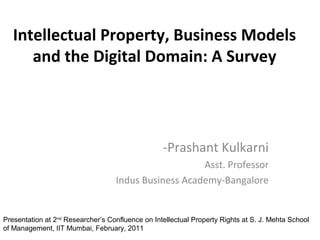Ip rs and digital domain
- 1. Intellectual Property, Business Models and the Digital Domain: A Survey -Prashant Kulkarni Asst. Professor Indus Business Academy-Bangalore Presentation at 2nd Researcher’s Confluence on Intellectual Property Rights at S. J. Mehta School of Management, IIT Mumbai, February, 2011
- 2. Economic Activities and Change – Internet and digital revolution • Pigeons/smoke-signals to internet – Diffusion of information within the society • 70% of wealth accumulated in the rich economies is in the form of intangible, knowledge based assets (Gelder, 2006) – Access to information (Assets) • Shift from the private corporations/State to Civil Society? – Recrafting Global Trade Rules? • Political Economy of TRIPS
- 3. IP Literature and Tradition Business Models • Weak foundations – System independent of space and time – Right holders’ limited-term monopoly and public benefit of unhindered access to scientific records and cultural traditions • Ignores key ownership questions • Shifting battlefield – Digitization of copyrights
- 4. IP and Digital Environment • Weak cross border regulations; liberal cross border flows • Authority inconsistent with global realities • Rise of non market and non proprietary means of production • Incompatibility of IPRs and Digital economy – Danny Quah’s characteristics
- 5. Digital Alternatives • Open Business Models (Chesbrough , 2003) – Recognize the value of ideas being generated outside the boundaries of the firm – Business-dependent value of IP is crucial for its effective utilization
- 6. Piracy is Good Lessig (2005) • Creativity vs Creativity (new regimes challenge the old) – Amateur creativity as collateral damage – Copyright wars criminalize creativity, drives piracy underground become corrosive • Brazil’s experience • Deregulate and decriminalize
- 7. Apple’s iTunes • P2P vs traditional music industry • Apple’s way –iTunes – Autonomy of choice – Freedom from legal hassles
- 8. Conclusions • Digital technologies serve as engines of cultural innovation • Technology is per se neutral • Reconciling and adapting their interests for both corporations and government will determine the future of the digital era









